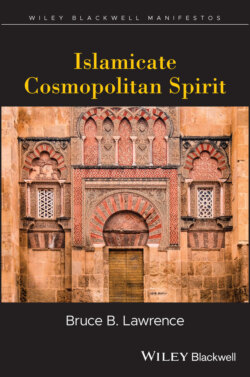Читать книгу Islamicate Cosmopolitan Spirit - Bruce B. Lawrence - Страница 13
Why Spirit? Because Islamicate Cosmopolitan is Fluid and Restless
ОглавлениеThe rapid spread of Islam in the 7th century compelled its conquering forces to adapt to multiple civilizations as far west as Spain and as far east as China. Islamicate civilization from the outset evinces a cosmopolitan ethos marked by the two key traits of longing and belonging. The belonging is always a reflex of power, the privilege of literacy and mobility but also the benefits of imperial patronage. All premodern Islamicate cosmopolitans benefited from hierarchical social-political structures. Yet that benefit did not limit their horizons, for allied with belonging was longing, the longing for something more, a surplus of benefit to humankind beyond their immediate time/space frame.
It is that surplus of benefit, which is also a higher level of meaning, that requires a further adjective as qualifier. To explore and try to explain Islamicate cosmopolitan one must recognize not just its origins but also its aspiration. There was never a fixed horizon. It was always an elan, a spirit, and cosmopolitans themselves, whatever their time/space belonging, remain spirited agents of change, delineated by their period and place in the canvas of human history but not delimited in their imagination or aspiration for a humane world order feels too generalized. To corral them as parochial, territorial, or ideological is to deny them their own deepest longing: to project beyond the limits of their loyalties to affirm others whatever their loyalties. They are less Islamicate cosmopolitan “national” subjects than aspiring agents of a multilingual, transnational Islamicate Cosmopolitan Spirit, both Persian and Arab, both Iranian and Semitic, heirs to others, harbingers of many others.
There are many who qualify as Islamicate cosmopolitan spirits through affirming this aspiration. One notable modern exemplar appears in the aftermath of the 2003 U.S. invasion of Iraq. Quoted above was the blogger Riverbend: “what is civilization? It’s not mobile phones, computers, skyscrapers, and McDonalds; It’s having enough security in your own faith and culture to allow people the sanctity of theirs …” One can trace a direct line from Diogenes, the Greek orator, who proclaimed: “I am a citizen of the world,” and his neighbour—not in time but in outlook—Riverbend. Crucially, it is important to note where in the world one claims to be a citizen. For Riverbend, unlike Diogenes, it was in the midst of a warzone, with material, social, and cultural destruction at a level that made the plea for cosmopolitan thinking a rescue shibboleth rather than a boutique advertisement. The distance from Martha Nussbaum’s notion of world citizenry is evident, and of course there are multiple detractors from any cosmopolitan identity. One need look no further than the opinion page of The New York Times, where Ross Douthat depicted what he called “the myth of cosmopolitanism” as subsuming others into “a meritocratic order that transforms difference into similarity, by plucking the best and brightest from everywhere and homogenizing them into the peculiar species that we call ‘global citizens.’”18 This is, of course, a caricature of cosmopolitan longing and belonging, depicted above, and while there are “Muslims” in this club, they do not reflect the Islamicate Cosmopolitan Spirit.
